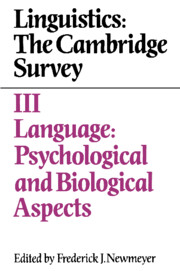Book contents
- Frontmatter
- Contents
- Contributors
- Preface
- 1 Psycholinguistics: an overview
- 2 Language and cognition
- 3 Processes in language production
- 4 Language perception
- 5 The mental lexicon
- 6 Where learning begins: initial representations for language learning
- 7 Second language acquisition
- 8 Neurolinguistics: an overview of language–brain relations in aphasia
- 9 The biological basis for language
- 10 Linguistics and speech–language pathology
- 11 The evolution of human communicative behavior
- 12 Linguistics and animal communication
- Index of names
- Index of subjects
- Contents of Volumes I, II, and IV
5 - The mental lexicon
Published online by Cambridge University Press: 03 February 2010
- Frontmatter
- Contents
- Contributors
- Preface
- 1 Psycholinguistics: an overview
- 2 Language and cognition
- 3 Processes in language production
- 4 Language perception
- 5 The mental lexicon
- 6 Where learning begins: initial representations for language learning
- 7 Second language acquisition
- 8 Neurolinguistics: an overview of language–brain relations in aphasia
- 9 The biological basis for language
- 10 Linguistics and speech–language pathology
- 11 The evolution of human communicative behavior
- 12 Linguistics and animal communication
- Index of names
- Index of subjects
- Contents of Volumes I, II, and IV
Summary
Introduction
The mental lexicon is that component of the grammar that contains all the information – phonological, morphological, semantic, and syntactic – that speakers know about individual words and/or morphemes.
It is an open question whether there is an isomorphism between the units and components of the grammar and those implemented and accessed in the linguistic processing system(s), even though a linguistic performance model is ultimately dependent on the grammar. Lexical structure as part of grammatical theory is discussed in Volume 1, Chapter 3, of this series; this chapter will therefore focus on psycholinguistic models of the lexicon. Both models are equally ‘mental’ but are directed toward answering different questions.
Psycholinguistic models have generally been concerned with how lexical information is accessed or processed and have been less explicit about the representation and structure of the information. The nature of the stored representations is important, however, because it may in part determine the nature of the access mechanisms. In addition, the proposed lexical access procedure has implications for internal lexical structure and representation within the mental lexicon. In this chapter we will examine a number of processing models of the lexicon, focussing on what they imply about the mental representation of words.
Many psycholinguistic models of the lexicon hypothesize separate subcomponents containing phonological, orthographic, and semantic information about words (Forster 1976; Morton 1979; Allport & Funnell 1981; Fromkin 1985). There is much evidence in support of this modular lexical structure. For example, access to phonological, orthographic, syntactic, and semantic information about words can be independently affected by damage to the brain.
- Type
- Chapter
- Information
- Linguistics: The Cambridge Survey , pp. 124 - 149Publisher: Cambridge University PressPrint publication year: 1988
- 11
- Cited by



